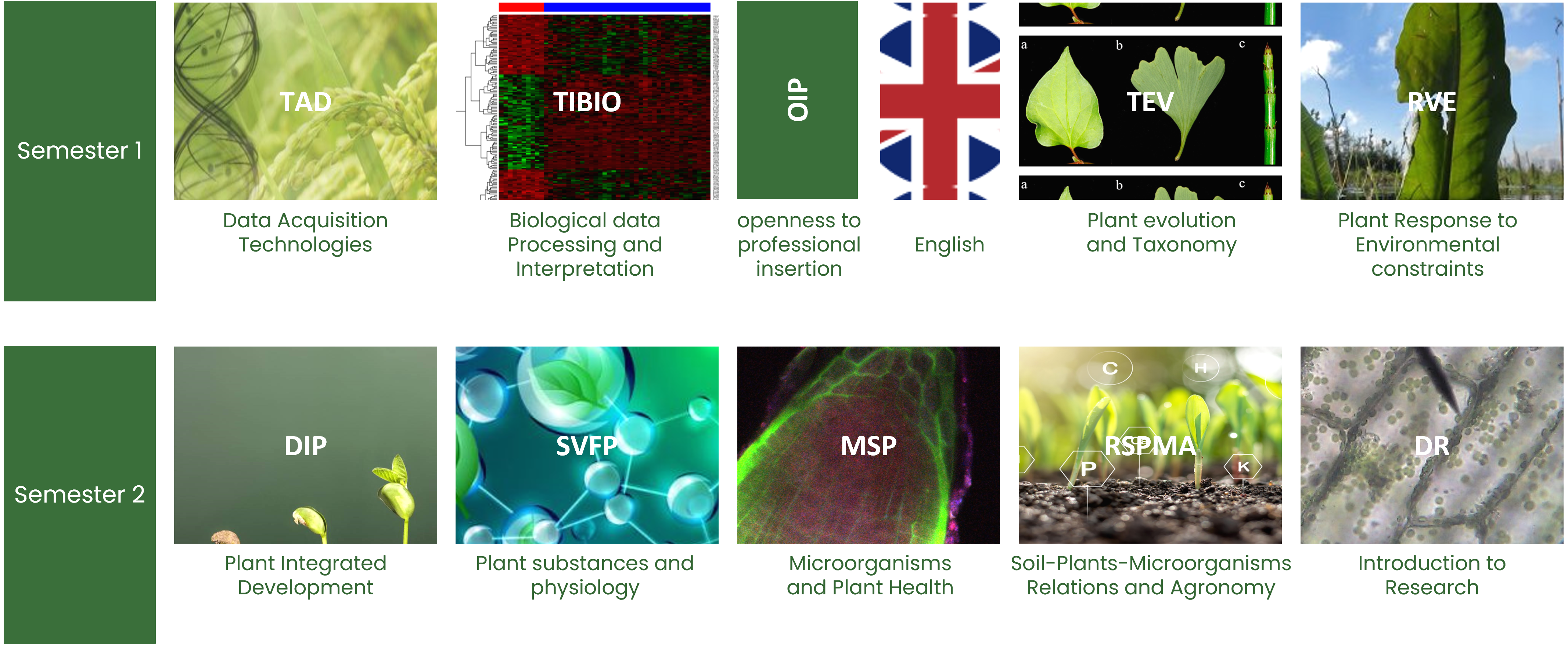Goals :
This Master’s Degree is for students who want to get knowledge in the fields of basic and applied plant biology.
It is accessible to students who have obtained a Bachelor’s Degree in Life Sciences, Life and Earth Sciences or any other program delivering 180 ECTS in the scientific fields the Admission Committee will consider relevant.
The program includes Teaching Units which are common to Masters in BEE (Biodiversity, Ecology and Evolution) and / or Microbiology, as well as Teaching Units specific to Plant Science. M1 courses will allow students to gain the basic knowledge necessary to follow M2courses both in M2 Plant Science and M2 PMIP.
This program aims to prepare students for careers or PhD programs.
Students who have validated year 1 (M1) can qualify for year 2 (M2), subject to obtaining an internship for year 2.
Program:
M1 offers common scientific Teaching Units (30 ECTS) as well as specialised Teaching Units (24 ECTS), together with an internship Teaching Unit (6 ECTS).
The five common Teaching Units bring fundamental bases to:
1) Understand the interactions between plant organisms with their biotic and abiotic environment, their evolution and the current tools available to study organisms from the genome to the metabolism.
2) Analyse biological data from experiments and
3) Introduce the students, through an internship project, to the world of academic or industrial research.
These Units offer students an interdisciplinary knowledge that is highly sought after today.
There are also 4 scientific Teaching Units, centered on the plant model, giving students a specialised knowledge in the fields of plant development, phytochemistry, industrial use of plant metabolites, taxonomy, plant adaptation to environmental constraints and agronomy.
Two other Teaching Units: English (3 ECTS)
Introduction to occupational integration (3 ECTS) to get a better knowledge of the professional world.

Semester 1 :
Data Acquisition Technology (6 ECTS):
This methodology-based Teaching Unit allows to get command of new technological breakthroughs that generate huge data sets, requiring the implementation of relevant data and storage bases.
This Unit is thus directly linked to the Biological data processing and interpretation Teaching Unit
Biological data Processing and Interpretation (6 ECTS):
Allows to get acquainted with experimental design and data analysis, putting forward the benefits of methodology. Statistical concepts and basic methodology will be introduced, data analysis and the connection with experimental design will be put into practice.
English (3 ECTS):
The objective is to reach at least the CECRL B2 Level.
Introduction to Occupational Integration (3 ECTS):
Students will be allowed to acquire methods and tools, to get a good knowledge of professional integration procedures.
Plant evolution and Taxonomy (6 ECTS):
This Teaching Unit deals with plant and -more succinctly- fungi classical and molecular broader taxonomy, as well as the Embryophytes evolutionary trends. Some applications will be studied.
Plant Response to Environmental constraints (6 ECTS):
The aim is to introduce the plant physiological responses to the environment biotic and abiotic factors fluctuations and their associated constraints , paying particular attention on the atmosphere composition changes (CO2, ozone,…). An important part of this Unit will deal with the human use of plants with specific physiological features to soils and water clean-up.
Semester 2 :
Plant Integrated Development (6 ECTS):
The aim is to understand the major stages of the plant development, from the seed to the flower, considering both the descriptive and molecular aspects.
Vegetal Substances and Plant Physiology (6 ECTS):
This Teaching Unit will introduce the diversity of plant metabolism (primary, secondary and hormonal), more particularly the development process, the various interconnections and the impact of hormones on those metabolisms. A specific attention will be paid to the physiological benefit of those molecules for the plant and to the main applications of the natural substances in various fields (cosmetics, health, agri-food, environment….)
Microorganisms and Plant Health (6 ECTS):
What is studied in this Teaching Unit is the mechanisms of the parasitic and phyto beneficial interactions between plants and deleterious microorganisms, as part of ecosystem functioning and management.
Soil-Plants-Microorganisms Relations and Agronomy (6 ECTS):
Sudents will be provided with knowledge and skills about the biological functioning of the soil-plant-microorganisms system. The fundamental aspects and the mechanisms implemented will be dealt with, as well as their main agronomic involvements.
Introduction to Research (6 ECTS):
Students will be familiarized with the world of research and will be given tools to define their work project through:
- I - a 7-week internship in a laboratory, or
- II – a bibliographical summary on a fundamental or applied research topic.
M1 admission requirements for the year 2025 – 2026:
Calendar:
To apply, please submit to the following link : MonMaster.gouv.fr (https://www.monmaster.gouv.fr/) and browse to the Plant Biology Master of Lyon
Application reviews will happens on April/May, 2026
Response notification to the applicants: June, 2026
The results will be available online, on the online platform: MonMaster.gouv.fr (https://www.monmaster.gouv.fr/)
Acceptation or rejection are to be made online ONLY, on the online platform: MonMaster.gouv.fr (https://www.monmaster.gouv.fr/)